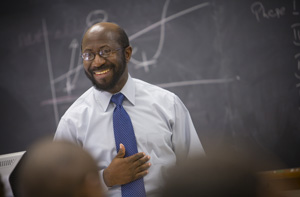Rexford Ahene, professor of economics and chair of Africana studies, will lead semester-abroad program next fall
 Students are in for some unforgettable experiences next fall when they spend the semester in Ghana in a program led by Rexford Ahene, professor of economics and chair of Africana studies. According to Ahene, the students will actively participate in local culture, not merely sit on the sidelines as observers.
Students are in for some unforgettable experiences next fall when they spend the semester in Ghana in a program led by Rexford Ahene, professor of economics and chair of Africana studies. According to Ahene, the students will actively participate in local culture, not merely sit on the sidelines as observers.
“The program provides the opportunity for education in a totally different cultural context as the African culture is uniquely different from western culture,” says Ahene, who led a semester-abroad program to Ghana in 2004 and also has led interim sessions abroad. “Study abroad helps students develop life skills that they cannot get in the classroom because it allows them to break out of their normal academic routines. The cultural differences and unique exposure help them learn to be patient and flexible and adapt to unfamiliar circumstances, giving them a better understanding of themselves and the world.”
Students will take courses at the University of Ghana in Legon and share dormitory rooms with Ghanaian students. Ahene will teach a special course called Contemporary Cultures and Social Change in Ghana. He has three weeks of travel planned as the basis for the course so that students can take part in traditional festivals and ceremonies.
“They will participate in and witness different cultural practices and festivals as they are actually occurring, instead of participating in something artificial set up for tourists,” he explains. “We will tour the country, which has more than 64 ethnically distinct linguistic groups and aspects of culture. We also will see indigenous industry, including rituals of psychotherapy–what some may call ‘witchdoctors’–and traditional skills and crafts such as the making of Kente, a fabric hand woven with silk and very elaborate designs, all of which have cultural meaning.”
Among the festivals students will see firsthand are Odwira and Aboakyer. Taking place in late August and early September, Odwira is akin to a thanksgiving festival immediately following the summer harvest. It is a period of purification and reaffirmation of political alliances and social and cultural relationships. Lasting about one week, the festival includes different activities each day including drums, dance, and ritual purification. Aboakyer, celebrated by the Fanti, is a competition designed to demonstrate hunting prowess, bravery, leadership, and organization. Different groups trap deer in the bush–without killing the animals–and bring them back to town to celebrate their skills.
For a course on international development, students will study alongside scholars from the Kofi Annan International Peacekeeping Training Centre. They will explore the issues of conflicts throughout Africa and methods for restoring peace and resolving disputes. Another course on African religion will be taught by Kofi Opoku, former professor of religious studies at Lafayette. Opoku will lead students in studying indigenous beliefs and examining the African worldview from a social science and humanities perspective. Other courses will focus on women in West Africa, history, dance, music, theater, gender, development, and nation-building.
Ghana is an ideal laboratory for learning about African culture, history, and politics, says Ahene, as it has developed in a very stable way.
“What the semester-abroad program will do for students is give them the chance to be deeply immersed in understanding the way African culture influences opportunities for Africans in contemporary Ghanaian development,” he says. “They will learn outside of books and experience new customs, food, music, and politics.”
 Students are in for some unforgettable experiences next fall when they spend the semester in Ghana in a program led by Rexford Ahene, professor of economics and chair of Africana studies. According to Ahene, the students will actively participate in local culture, not merely sit on the sidelines as observers.
Students are in for some unforgettable experiences next fall when they spend the semester in Ghana in a program led by Rexford Ahene, professor of economics and chair of Africana studies. According to Ahene, the students will actively participate in local culture, not merely sit on the sidelines as observers.